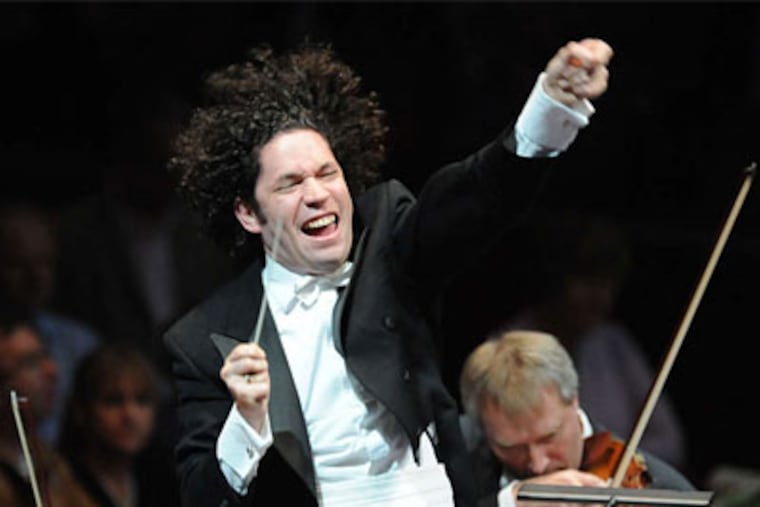Gustavo Dudamel, Simón Bolívar Symphony Orchestra at Kimmel
They just couldn't let him go. As Gustavo Dudamel basked in audience love along with the Simón Bolívar Symphony Orchestra of Venezuela Wednesday night, a few in Verizon Hall unfurled Venezuelan flags and shouted suggested encores.

They just couldn't let him go. As Gustavo Dudamel basked in audience love along with the Simón Bolívar Symphony Orchestra of Venezuela Wednesday night, a few in Verizon Hall unfurled Venezuelan flags and shouted suggested encores.
"After this huge piece," the conductor said in the wake of a Strauss tone poem, "we're getting old."
Who knew about this gift for being coy? The audience got its encore, and then another.
People come to classical music for all kinds of reasons - thank goodness - and this audience came to connect with youth, energy, and Venezuelan pride. Few events boast the kind of explosion that came with the second encore, Pedro Gutierrez's "Alma Llanera." Men held up red-blue-yellow blazers patterned like the Venezuelan flag, the audience sang with heart, and one listener stood and air-conducted.
This was Kimmel Center Presents' only imported orchestra this season. Budgetary concerns compelled the Kimmel to drop a penciled-in date with the Vienna Philharmonic, a scenario pregnant with significance. The populist vote has edged out the aficionados. Dudamel is a product, the winsome poster boy, of the highly successful evangelization in his home country of El Sistema, the music-as-social-tool program. As Kimmel president Anne Ewers said in her curtain speech, this is the future.
The movement has taken hold in the United States, including West Philadelphia, where the Play On, Philly! program has had initial artistic and philanthropic success. (Dudamel was scheduled to lead those students in an open rehearsal Wednesday afternoon at the Curtis Institute of Music, but canceled, citing a cold and a late night.)
The Simón Bolívar makes a huge sonic impression, precisely because it is huge. The program lists 200 members. The string section alone (20 violas, 14 double basses!) has about 100 members, roughly the size of the entire Philadelphia Orchestra. In Strauss' An Alpine Symphony, the massing was impressive, even when the details were not. The string sound is bright rather than textured or layered. Carlos Chávez's Sinfonía India and Julián Orbón's Tres versiones sinfónicas formed the first half of the program - twin rarities in these parts we were grateful to hear. The lack of subtlety evident in Dudamel's account of those pieces was heightened in the first encore, the Liebestod from Wagner's Tristan und Isolde, which had a preprogrammed feel, a lack of concern for pacing and scaling of dynamics. It was music that just wanted to get to the end.